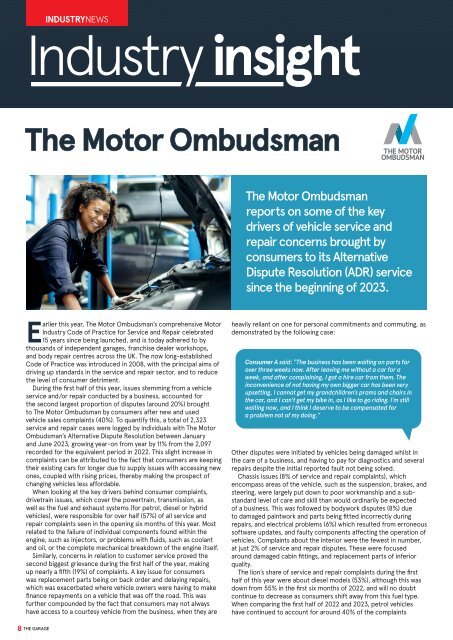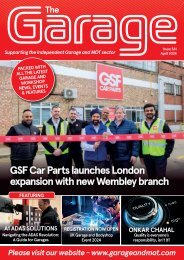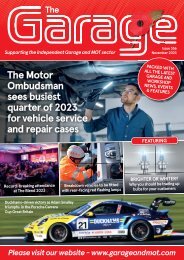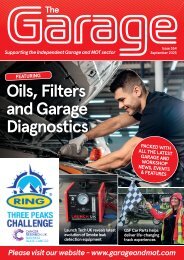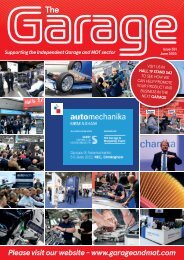The Garage 353
Create successful ePaper yourself
Turn your PDF publications into a flip-book with our unique Google optimized e-Paper software.
INDUSTRYNEWS<br />
Industry insight<br />
<strong>The</strong> Motor Ombudsman<br />
<strong>The</strong> Motor Ombudsman<br />
reports on some of the key<br />
drivers of vehicle service and<br />
repair concerns brought by<br />
consumers to its Alternative<br />
Dispute Resolution (ADR) service<br />
since the beginning of 2023.<br />
Earlier this year, <strong>The</strong> Motor Ombudsman’s comprehensive Motor<br />
Industry Code of Practice for Service and Repair celebrated<br />
15 years since being launched, and is today adhered to by<br />
thousands of independent garages, franchise dealer workshops,<br />
and body repair centres across the UK. <strong>The</strong> now long-established<br />
Code of Practice was introduced in 2008, with the principal aims of<br />
driving up standards in the service and repair sector, and to reduce<br />
the level of consumer detriment.<br />
During the first half of this year, issues stemming from a vehicle<br />
service and/or repair conducted by a business, accounted for<br />
the second largest proportion of disputes (around 20%) brought<br />
to <strong>The</strong> Motor Ombudsman by consumers after new and used<br />
vehicle sales complaints (40%). To quantify this, a total of 2,323<br />
service and repair cases were logged by individuals with <strong>The</strong> Motor<br />
Ombudsman’s Alternative Dispute Resolution between January<br />
and June 2023, growing year-on from year by 11% from the 2,097<br />
recorded for the equivalent period in 2022. This slight increase in<br />
complaints can be attributed to the fact that consumers are keeping<br />
their existing cars for longer due to supply issues with accessing new<br />
ones, coupled with rising prices, thereby making the prospect of<br />
changing vehicles less affordable.<br />
When looking at the key drivers behind consumer complaints,<br />
drivetrain issues, which cover the powertrain, transmission, as<br />
well as the fuel and exhaust systems (for petrol, diesel or hybrid<br />
vehicles), were responsible for over half (57%) of all service and<br />
repair complaints seen in the opening six months of this year. Most<br />
related to the failure of individual components found within the<br />
engine, such as injectors, or problems with fluids, such as coolant<br />
and oil, or the complete mechanical breakdown of the engine itself.<br />
Similarly, concerns in relation to customer service proved the<br />
second biggest grievance during the first half of the year, making<br />
up nearly a fifth (19%) of complaints. A key issue for consumers<br />
was replacement parts being on back order and delaying repairs,<br />
which was exacerbated where vehicle owners were having to make<br />
finance repayments on a vehicle that was off the road. This was<br />
further compounded by the fact that consumers may not always<br />
have access to a courtesy vehicle from the business, when they are<br />
heavily reliant on one for personal commitments and commuting, as<br />
demonstrated by the following case:<br />
Consumer A said: “<strong>The</strong> business has been waiting on parts for<br />
over three weeks now. After leaving me without a car for a<br />
week, and after complaining, I got a hire car from them. <strong>The</strong><br />
inconvenience of not having my own bigger car has been very<br />
upsetting, I cannot get my grandchildren’s prams and chairs in<br />
the car, and I can’t get my bike in, as I like to go riding. I’m still<br />
waiting now, and I think I deserve to be compensated for<br />
a problem not of my doing.”<br />
Other disputes were initiated by vehicles being damaged whilst in<br />
the care of a business, and having to pay for diagnostics and several<br />
repairs despite the initial reported fault not being solved.<br />
Chassis issues (8% of service and repair complaints), which<br />
encompass areas of the vehicle, such as the suspension, brakes, and<br />
steering, were largely put down to poor workmanship and a substandard<br />
level of care and skill than would ordinarily be expected<br />
of a business. This was followed by bodywork disputes (8%) due<br />
to damaged paintwork and parts being fitted incorrectly during<br />
repairs, and electrical problems (6%) which resulted from erroneous<br />
software updates, and faulty components affecting the operation of<br />
vehicles. Complaints about the interior were the fewest in number,<br />
at just 2% of service and repair disputes. <strong>The</strong>se were focused<br />
around damaged cabin fittings, and replacement parts of inferior<br />
quality.<br />
<strong>The</strong> lion’s share of service and repair complaints during the first<br />
half of this year were about diesel models (53%), although this was<br />
down from 55% in the first six months of 2022, and will no doubt<br />
continue to decrease as consumers shift away from this fuel type.<br />
When comparing the first half of 2022 and 2023, petrol vehicles<br />
have continued to account for around 40% of the complaints<br />
8 THE GARAGE<br />
8,9 Industry Insight TMO.indd 1 27/07/2023 12:20


